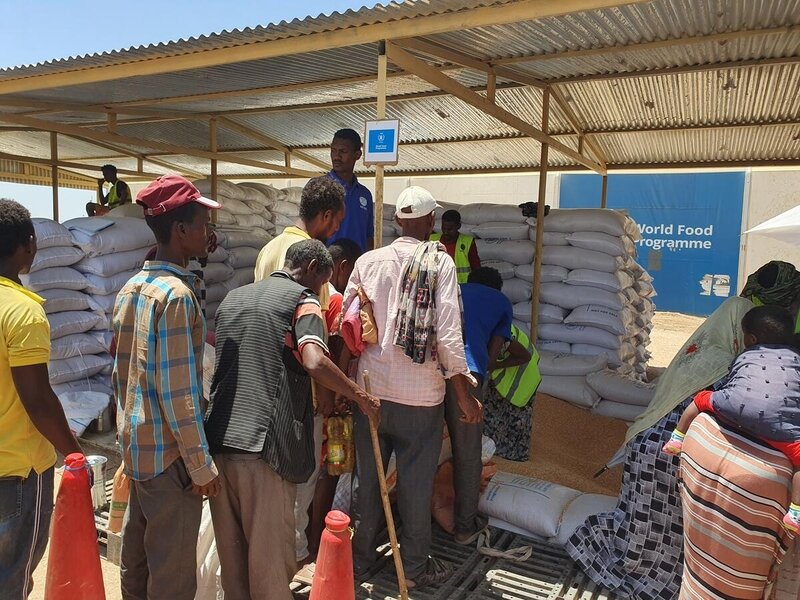WFP resumes operations in Sudan, EU launches humanitarian air bridge

WFP plans to reach more than 384,000 people with immediate food distributions such as this one for Tigrayan refugees in El Gedaref State. (Photo: WFP / Ali Khalafalla)
ROME / BRUSSELS / PORT SUDAN –
The World Food Programme (WFP) has resumed food assistance to hundreds of thousands of people at threat in Sudan. The European Union launched a humanitarian air bridge to address the growing humanitarian needs. In Port Sudan, capital of Red Sea state, where many people from Khartoum have sought shelter, civil initiatives are providing support, but challenges remain.
The WFP has resumed food assistance to provide for hundreds of thousands of people in the country, despite the security challenges.
“For many people, food and other supplies are running low,” said WFP Sudan Country Director Eddie Rowe. “If they are available, they are way beyond the purchasing power of ordinary Sudanese.”
In a press release on Tuesday, WFP announced plans to immediately reach more than 384,000 people in El Gedaref, Kassala, El Gezira, and White Nile state, with hopes to begin food distributions in a fifth state, the Blue Nile region, soon. The food is reaching the most vulnerable.
“As emergency operations ramp up over the coming months, WFP plans to support nearly five million people in Sudan with emergency food assistance and 600,000 children and women with prevention and treatment of malnutrition.”
The European Union launched a humanitarian air bridge. In a press statement yesterday, the EU said that 30 tonnes of essential items, including water, sanitation and hygiene, and shelter equipment, have been transported from UN warehouses in Dubai to Port Sudan. Upon arrival, the aid was delivered to the UN Children’s Fund (UNICEF) and the WFP.
According to a recent FEWS NET report, about 19 million people in Sudan face acute food insecurity. The current population of the country is estimated to be more than 46 million.
Since April 15, when fierce fighting between the Sudanese army and the paramilitary Rapid Support Forces erupted in the country’s capital, hundreds of thousands fled their homes. More than 700,000 people sought refuge in other places in the country, another 150,000 Sudanese and refugees of other nationalities fled to neighbouring countries.
Port Sudan
The capital of Red Sea state,is currently seeing an influx of Sudanese and foreign nationals who fled the violence in Khartoum.
Approximately 20 shelters, in schools, places of worship, associations, parks, and wedding halls, have been made available for thousands of displaced people.
Zeinab Osman, a representative of the Red Sea Organisations and Associations, told Radio Dabanga from Port Sudan that several initiatives are set up to help the affected people with shelter and food services. However, the challenges they face include a lack of network availability, weak communication, lack of cash liquidity, and lack of government support.











 and then
and then